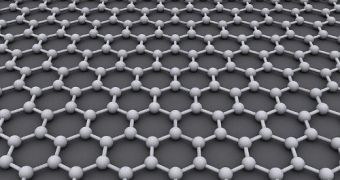For quite a while now graphene has been the object of many studies as scientists try to better understand this material and use it as a replacement for silicon in future computer chips, and a recent discovery comes to strengthen graphene's role in transistor manufacturing since researchers have just found out that it has the capability to cool itself.
This means that chips built using graphene could run cooler and be more energy efficient than their silicon counterparts.
The discovery was made by a team of scientists at the University of Illinois lead by engineering professor William King and computer engineering professor Eric Pop.
Graphene’s self-cooling ability was observed using an atomic force microscope tip as a temperature probe to make the first nanometer-scale temperature measurements of a working graphene transistor, reports DailyTech.
As a result, the researchers have found out that, unlike silicon, the waste heat produced by graphene was weaker than its thermo-electric cooling effect, which means that chips built using this material will be cooler than current circuits built using traditional substrates.
“In silicon and most materials, the electronic heating is much larger than the self-cooling,” said professor William King.
“However, we found that in these graphene transistors, there are regions where the thermoelectric cooling can be larger than the resistive heating, which allows these devices to cool themselves. This self-cooling has not previously been seen for graphene devices.”
Graphene is two-dimensional allotrope of carbon made from a hexagonal lattice of carbon atoms and their bonds.
As a result, the material is just one-atom thick, paving the way for the fabrication of some of the smallest transistors possible.
Its role in transistor manufacturing is studied by companies such as IBM and Intel, but the greatest obstacle in graphene's path is the material's inability to be completely switched off, which raises energy efficiency and gate signaling problems.
For this reason, the industry is not expected to move away from silicon anytime soon as Mike Mayberry, Intel's director of components research, reiterated earlier this year: “Silicon’s properties make it a nearly ideal material. The industry has so much experience with it that there are no plans to move away from silicon as the substrate for chips.”

 14 DAY TRIAL //
14 DAY TRIAL //